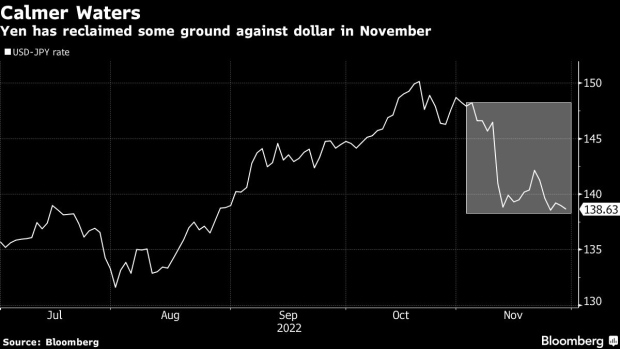Nov 30, 2022
Japan’s Government Stayed Out of Currency Markets in November
, Bloomberg News

(Bloomberg) -- Japan stayed out of the foreign exchange market in November, after the yen made gains amid growing expectations that the Federal Reserve will moderate its pace of interest rate hikes.
The finance ministry disclosed Wednesday figures showing that it didn’t intervene in currency markets from Oct. 28 to Nov. 28.
Read more: US Inflation Finally Offers Relief, But There’s a Long Way to Go
US inflation came in weaker than expected in October, enabling the yen to regain some ground this month on expectations that the Fed will temper its aggressive rate hikes as inflation shows signs of peaking around the world. Fed minutes released last week also backed up a more moderate outlook for policy tightening.
The stepping back from intervention removes for now a potential source of conflict between Washington and Tokyo. The US continues to monitor trading partners over their currency policy. So far it hasn’t taken any public action to indicate disapproval of Japan’s decision to prop up the yen for the first time in around a quarter century or the apparent sale of Treasuries to fund it.
“The yen weakening trend shifted after the US CPI results came out, with US yields coming down in November,” said economist Atsushi Takeda at Itochu Research Institute before the data was released. “I see the yen staying between around 135 and 140 for a while, but it’ll take some time before a gradual yen strengthening trend emerges.”
In October the government spent a record 6.3 trillion yen ($45.4 billion) to intervene in the market after the yen tumbled close to 152 per dollar at one point. In recent weeks the yen has been hovering around 138 to 142 to the greenback, far from the zone where the last intervention likely took place.
Still, Takeda warned that a return close to the 150 yen level can’t be completely ruled out.
“One thing that could happen is that views on US monetary policy shift toward hawkishness again,” said Takeda. “Another is that Japan’s trade balance keeps expanding its deficit levels, given faltering exports. That could become a reason to sell the yen again.”
©2022 Bloomberg L.P.





